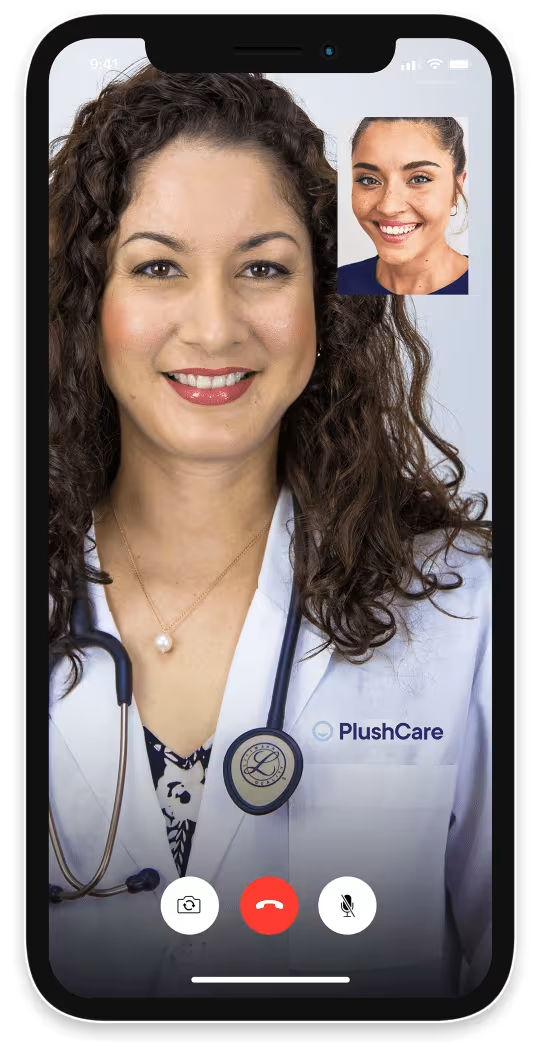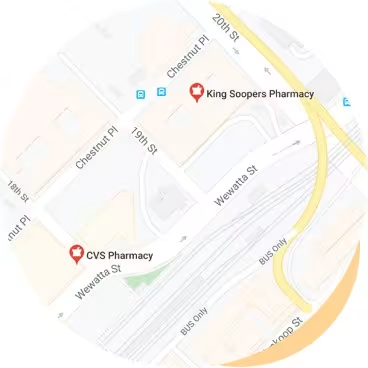- Sexual Health
- STDs
Gonorrhea
Gonorrhea treatments - online prescriptions available today
In order to treat your gonorrhea, consult with a board-certified doctor online today to prescribe antibiotics to decrease burning symptoms, if you qualify. Get a same-day prescription to treat gonorrhea or refill an existing prescription.*
Book an appointmentOnline treatment for discreet gonorrhea care
Effective oral antibiotics for gonorrhea treatment
Take control of your sexual health
*Prescriptions are provided at the doctor's discretion. Learn more about our controlled substances policy and how to save up to 80% with our prescription discount card. PlushCare doctors cannot treat all cases of gonorrhea. Our primary care physicians can conduct an initial evaluation of your symptoms but may need to refer you to a specialist or for in-person treatment. If you are experiencing life-threatening symptoms, seek emergency medical attention immediately.

Learn about gonorrhea
Gonorrhea, sometimes called "the clap" or "the drip," is a sexually transmitted infection (STI) that affects both women and men. It is caused by an infection by the bacterium Neisseria gonorrhoeae.
This bacterial infection is transmitted by having oral, anal, or vaginal sex with a person who has gonorrhea. Rarely, in addition to the genitals and rectum, gonorrhea can also infect the eyes, throat, or joints. Gonorrhea is one of the most common STIs in the United States with about 1.14 million cases annually.
Gonorrhea causes
Gonorrhea is a sexually transmitted infection caused by the Neisseria gonorrhoeae bacterium. This means that it is passed from one person to another through sexual contact, including oral, vaginal, or anal sex.
Gonorrhea symptoms
The most common symptoms of gonorrhea in men and women are:
Discharge that may be watery, creamy, slightly green or yellow
Burning sensation while urinating (dysuria)
Pain during sex
Painful, burning and swollen glands in throat
Painful bowel movements

How to treat gonorrhea
Since gonorrhea is caused by a bacterial infection, gonorrhea treatment is a regimen of oral antibiotics. The most commonly used is oral azithromycin (Z-pack).
Some strains of gonorrhea in the US have become antibiotic resistant, referred to as "super gonorrhea," and may need stronger, intravenous antibiotics if standard antibiotic treatments fail.
Gonorrhea medication
Antibiotics

How to prevent gonorrhea
If you are sexually active, here are some things you can do to lower your chances of being infected with gonorrhea:
Use protection: Using condoms correctly every time you engage in sexual activity can help reduce the risk of sexually transmitted infections. It is important to keep in mind that condoms are not 100% effective.
Get tested regularly: Getting tested for STIs regularly can help you prevent spread to others, and having a history of sexually transmitted infections increases your likelihood of contracting another. If you and your partner(s) get tested regularly, it helps limit exposure.
Limit your number of sexual partners: Limit your number of sex partners and have yourself and each partner get tested before having sex. This may be easier to do with fewer partners. The more partners you have at any given time increases your likelihood of getting gonorrhea or any other STI.
Avoid douching: Douching refers to washing the vagina either with a product that can include antiseptics and fragrances. Medical professionals agree that douching is not effective and can increase your risk of sexual health issues, as it upsets the natural environment of the genitals.

When to see a doctor for gonorrhea
If you notice any of the symptoms of gonorrhea, you should make an appointment with a doctor immediately. If you have gonorrhea, it is important to seek treatment as soon as possible not only to prevent spread to others, but also to prevent spread to other parts of the body. Untreated gonorrhea could spread as far as the blood and joints, which could be fatal.
If you suspect you may have a STI, it is very important to get tested. Even if you have no symptoms, if you are sexually active, you should get tested regularly so as to avoid unknowingly spreading STIs to others.
Gonorrhea treatment FAQs
How to test for gonorrhea?
In most cases gonorrhea is tested for using a urine sample. If you have symptoms of oral gonorrhea or gonorrhea of the eyes, swabs will be taken from the symptomatic areas.
What is the best treatment for gonorrhea?
If you test positive for gonorrhea don’t stress- it is treatable with antibiotics. You will work with your doctor to create a comprehensive treatment plan including an antibiotic prescription. Your partner(s) should also start a course of antibiotics as well if they’ve been exposed. Antibiotics work in 95% of gonorrhea cases. Refrain from sexual activity until your infection has cleared and your doctor gives you the go ahead.
What is the best medication for gonorrhea?
The best medication for gonorrhea is a course of antibiotics. Azithromycin is most commonly prescribed, but for antibiotic-resistant strains of gonorrhea, the antibiotic ceftriaxone may be given intravenously in addition.
Can I get gonorrhea treatment online?
An online doctor can write you a lab referral so you can receive STI testing. This referral is required by most labs before you can receive testing. During your virtual visit, our doctors will hear your symptoms and refer you to your closest lab. Once your results come in the doctor will get in touch with you to give you an official diagnosis and treatment plan, including any necessary prescription medications.
Can you reinfect yourself with gonorrhea during treatment?
It is possible to be reinfected with gonorrhea, during the same time that you are taking your treatment.
Why is gonorrhea called the clap?
Gonorrhea was commonly referred to as the clap due to an old treatment method where infected genitals were clapped between the palms to expel discharge. However, this term is outdated, and using the accurate medical name is recommended.
How long will I test positive for gonorrhea after treatment?
Gonococcal DNA will remain for up to 2 weeks after treatment. It is recommended that you test again 2 weeks, and 3 months following treatment.
Can gonorrhea go away without treatment?
It’s a bad idea to try to wait out a gonorrhea infection for two main reasons. First, the infection may get worse and spread to other areas of your body causing worsening symptoms and lasting damage to your reproductive organs, including fatal blood and joint conditions. Second, the longer you have gonorrhea the more likely you are to spread it. Considering gonorrhea is easily treated with antibiotics, and you can get prescribed online, there really is no good reason to delay treatment.
How long does gonorrhea last after treatment?
Gonorrhea symptoms should be resolved after treatment, but you may test positive for gonorrhea until two weeks after treatment.
What antibiotics kill gonorrhea?
Since gonorrhea is a bacterial infection, any antibiotic will kill it. However, for antibiotic-resistant strains, you may need to be given an intravenous dose of ceftriaxone, one of the cephalosporin antibiotics, in addition to oral azithromycin.
How long does gonorrhea take to treat?
Gonorrhea can be treated in one to two weeks, although symptoms may resolve after a few days. However, it is important to take the full course of antibiotics to clear the infection.
What does gonorrhea look like?
The visible symptoms of gonorrhea include redness and swelling of the genitals, and abnormal discharge that is yellow or green in color. That said, not everyone with an infection will display these symptoms. In fact, more than 50% of women with gonorrhea show no symptoms.
Is gonorrhea curable?
Since gonorrhea is caused by a bacterial infection, gonorrhea treatment is a regimen of oral antibiotics. Some strains of gonorrhea in the US have become antibiotic resistant, sometimes called “Super Gonorrhea”. Therefore, a medical physician will decide on the best course of antibiotics, with some of the commonly recommended ones being: ceftriaxone, cefixime, doxycycline, or azithromycin (the brand name is Zithromax). The infection should clear after one to two weeks. You should never stop taking antibiotics until the recommended course is finished, even if you think the infection cleared or you are feeling better.
What does gonorrhea smell like?
Gonorrhea typically does not have an odor. That said, some women report a mushroom-like smell in the genital area.
Which is worse, chlamydia or gonorrhea?
Both of these STDs are caused by bacteria. They have many overlapping symptoms and are both treated with antibiotics. One is not worse than the other, they both have complications that can arise and should each be tested for as soon as you notice symptoms to determine the best course of treatment.
Can you die from gonorrhea?
Untreated gonorrhea can spread to the blood and joints which can be fatal. It can also lead to complications such as increased risk of HIV which can also cause death. When treated promptly and effectively gonorrhea is not life threatening.
Can you get gonorrhea from kissing?
No, someone with gonorrhea cannot pass it along via kissing.
3 simple steps to request treatment for gonorrhea online

Step 1
Book a gonorrhea treatment appointment.
Book a same day appointment from anywhere.

Step 2
Talk to your medical provider regarding your gonorrhea symptoms.
Visit with a doctor on your smartphone or computer.

Step 3
Pick up a prescription to treat gonorrhea.
We can send prescriptions to any local pharmacy.
Related conditions to gonorrhea
HIV & AIDS
Chlamydia
Syphilis
Herpes
Hepatitis
Gonorrhea treatment pricing details
How pricing works
To request gonorrhea treatment online and get a new or refill on your prescription, join our monthly membership and get discounted visits.
Paying with insurance
Membership
$16.99/month
First month free
Visits
Copay
30 days of free membership
Same-day appointments 7 days a week
Unlimited messages with your Care Team
Prescription discount card to save up to 80%
Exclusive discounts on lab tests
Free memberships for your family
Cancel anytime
Visit price with insurance
Often the same as an office visit. Most patients with in-network insurance pay $30 or less!
We accept these insurance plans and many more:
Paying without insurance
Membership
$16.99/month
First month free
Visits
$129
30 days of free membership
Same-day appointments 7 days a week
Unlimited messages with your Care Team
Prescription discount card to save up to 80%
Exclusive discounts on lab tests
Free memberships for your family
Cancel anytime
Visit price without insurance
Initial visits are $129.
If we're unable to treat you, we'll provide a full refund.
Frequent sexual health searches
Gonorrhea treatment resources
Sources:
PlushCare is dedicated to providing you with accurate and trustworthy health information.
CDC (Centers for Disease Control and Prevention): "Gonorrhea - CDC Fact Sheet (Detailed)." CDC. Accessed on December 5, 2023, at https://www.cdc.gov/std/gonorrhea/treatment.htm.
Mayo Clinic: "Gonorrhea - Diagnosis and Treatment." Mayo Clinic. Accessed on December 5, 2023, at https://www.mayoclinic.org/diseases-conditions/gonorrhea/diagnosis-treatment/drc-20351780.
Cleveland Clinic: "Gonorrhea." Cleveland Clinic. Accessed on December 5, 2023, at https://my.clevelandclinic.org/health/diseases/4217-gonorrhea.
PlushCare content is reviewed by MDs, PhDs, NPs, nutritionists, and other healthcare professionals. Learn more about our editorial standards and meet the medical team. The PlushCare site or any linked materials are not intended and should not be construed as medical advice, nor is the information a substitute for professional medical expertise or treatment.